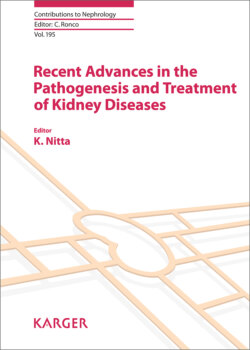Читать книгу Recent Advances in the Pathogenesis and Treatment of Kidney Diseases - Группа авторов - Страница 21
На сайте Литреса книга снята с продажи.
Abstract
ОглавлениеMinimal change nephrotic syndrome (MCNS) usually responds to steroids but frequently relapses, requiring additional treatment with immunosuppressive agents. Rituximab is a chimeric murine/human monoclonal immunoglobulin G1 antibody that targets CD20, a B-cell differentiation marker. B-cell recovery begins at approximately 6 months following the completion of treatment. Rituximab has a beneficial effect, with the sustained remission or reduction of proteinuria in patients with steroid-dependent MCNS. Relapses are thought to be associated with an increase in CD19 cells. The mean serum half-life of rituximab was reported to be 10–15 days in patients with steroid-dependent MCNS. Only infusion reactions, such as rash and chills, occurred after single-dose rituximab infusion and can be managed by pre-medication or infusion rate adjustments. Even though severe adverse effects of rituximab are not expected, we must be aware of potentially life-threatening adverse effects. Controlled randomized trials that include adult patients with steroid-dependent MCNS are required to prove the efficacy and safety of rituximab and to evaluate the cost-effectiveness of rituximab treatment. In this review, we highlight recent studies and discuss the effects of these studies on the management of patients with MCNS in adults.
© 2018 S. Karger AG, Basel
Minimal change nephrotic syndrome (MCNS) accounts for 12.6% of all cases of primary adult nephrotic syndrome in Japan [1]. MCNS usually responds to glucocorticoids (steroids), and the long-term prognosis is generally good. However, up to 50% of MCNS patients frequently relapse, requiring additional treatment with immunosuppressive agents. Frequent relapses may need prolonged treatment with 2 or more immunosuppressive drugs, with the result that these patients develop steroid-dependent nephrotic syndrome as adults [2]. Most cases of MCNS are idiopathic and not directly associated with an underlying disease in adults.
The pathophysiology of MCNS remains poorly understood. Shalhoub proposed that the cause of MCNS is a T cell-secreted circulating factor that damages the glomerular basement membrane [3]. Although this circulating factor has not been identified, a recent study highlights a role of immune dysregulation in MCNS. T-regulatory cells, which attenuate immune response by suppression of T-effector cells, are dysfunctional in humans with MCNS [4]. In contrast to the well-established involvement of T-cells in MCNS, the role of B cells is uncertain. Recently, it was shown that nuclear factor-related kappa B is upregulated during the relapse of MCNS, mainly in CD4+ T cells and B cells, and this induces the activation of AP1 signaling [5]. B-cell biology, however, has attained more attention lately, since treatment with rituximab, a monoclonal antibody directed against CD20 bearing cells, has shown good therapeutic responses in the treatment of MCNS.
